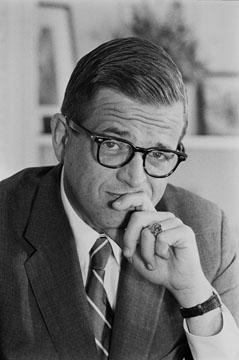3 Lives at Their Height in the 1970s Tell Our Contemporary Story
By • May 3, 2012 0 928

Deaths are like the things that happen in haunted houses, events when you hear of them that immediately bring back memories, stir up ironies and create flickering images or music that’s stayed in your head for decades.
At least that’s the case for three recent passings: Charles W. Colson, one of the more lively characters during the Watergate scandal, considered a deft dirty trickster who went on to jail and redemption as a born-again Christian; Jonathan Frid, the fine actor who couldn’t escape his role as vampire Barnabas Collins on the day-time soap opera, “Dark Shadows”; and Levon Helm, the heart and beat of The Band, arguably one of the best American rock bands ever.
CHARLES W. ‘CHUCK’ COLSON
Bob Woodward, who should know, once said the Nixon tapes were a gift that keep on giving. If the tapes are a gift, then Watergate itself was a kind of national curse that keeps rising out of the water like “Swamp Thing.” It remains one of those events–an event that ended in the only resignation of a sitting American president–that has so many dizzying side streets and layers that end up in fog-filled dead ends that it defies clarity. It’s a scandal that seems equal parts comedy and tragedy.
Colson — an owlish, stocky, genial sort was known as Nixon’s hatchet man, which may or may not be a fair judgement — had a lot more to him than the dirty tricks, although he did compile Nixon’s enemies list. He was also considered a sharp (and real) political strategist, who created Nixon’s image as a champion of the conservative working class. Colson died after a brain hemmorage at the age of 80 this month. By that time, in his mind and post-Watergate history, he was no longer Chuck Colson, hatchet man, but a born-again Christian and evangelical who had to some degree redeemed himself by founding a world prison fellowship ministry.
Press stories focused on both things, but always led with his participation in Watergate which led to his going to prison. In some ways, everyone touched by Watergate — from President Richard Nixon and Elliot Richardson to Gerald Ford — had Watergate as a lodestone in their obituary.
In the end, Watergate perhaps needs a Shakespeare. It has a Thomas Mallon, who in his very recent novel, “Watergate,” makes a fiction out of the men and women and events of the scandal, in such a way, that it becomes more real than the known facts.
Colson doesn’t figure strongly as a character in “Watergate,” but he gets talked about a lot by the characters who struggle to escape the aftershocks of every turn and twist of the scandal. Instead, Mallon, who has a gift for historical fiction — he wrote “Henry and Clara,” a moving imagining of the after-assassination life of the couple who sat in Lincoln’s box to see “Our American Cousin” — has create a fictional Watergate, one in which Alice Roosevelt Longworth, the reigning doyen of D.C. at the time and the daughter of Theodore Roosevelt, tosses acerbic barbs at the likes of Joseph Alsop, Richardson and other Georgetown residents of the time, and in which Rosemary Woods and Pat Nixon share vivid and sympathetic center stage with Nixon, Fred LaRue and E. Howard Hunt.
These Nixons, Hunts and La Rues have thoughts and memories, and conversations which are all invented and imagined and thoroughly authentic. The death of Colson makes you think of the book, which makes you think of the haunted house that is Watergate, minus one less resident.
JONATHAN FRID, 87
The death of Jonathan Frid at the age of 87 happened just as trailers and ads for the huge Tim Burton-Johnny Depp movie version of “Dark Shadows” are appearing in theaters and on television, an act of serendipity that is every bit as haunting as the cobwebbed professional life of Frid.
Frid was the resurrected vampire Barnabas, a chilling, if a little schtick-like vampire revived after a 200-year-hiatus, still mourning the death of a lost love as only vampires can. Frid became a star and a kind of cult figure with his portrayal of Barnabas, gaining a kind of Star Trek-like status and after-life at “Dark Shadows” conventions and the like. But he also never escaped the cape of Barnabas into a major television or movie career. Barnabas, for Frid, it turned out was indeed deathless, like Superman was for George Reeves.
His last role was, along with other “Dark Shadows” actors, a cameo in the new “Dark Shadows.”
LEVON HELM, 71
Levon Helm was a dynamo drummer, had bearded-skinny-hippie looks, and a gravelly, gritty voice which resonated with acoustic Americana feelings.
He was in The Band.
Long after the iconic and uber-American rock band dissolved, Helm was still playing, recording, singing, to great acclaim and honors and in some ways turned out to be the Band’s most productive and enduring member. Americana indeed: Helm was still winning Grammy Awards nearly to his dying days with “Dirt Farmer,” which won a Grammy in 2007 for Best Traditional Folk Album, and “Electric Dirt,” which won the first-ever Grammy for Best Americana Album in 2009.
The music from those albums seemed resonant of the legendary Band’s high-water mark successes, first as a backup group for Bob Dylan, and then on its own, a sheer icon of excellence, all between 1968 and 1976, eight years of glory.
The Band was: Garth Hudson, on organ, Robbie Robertson, guitar; Rick Danko, bass, Richard Manuel, piano and Levon Helm, drums.
They performed “The Night They Drove Old Dixie Down,” “Up on Cripple Creek” and “The Weight.”
Their songs are ageless. So was Helm, one of the survivors. He kept right on playing, his voice turning into a rasp.

